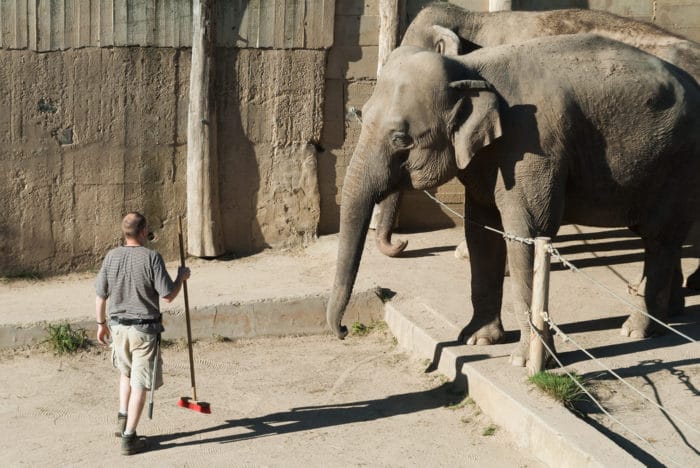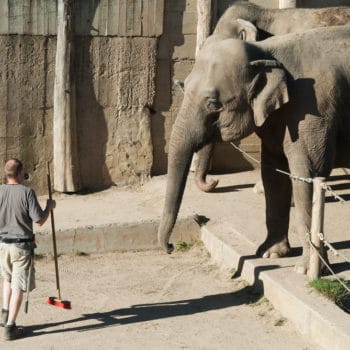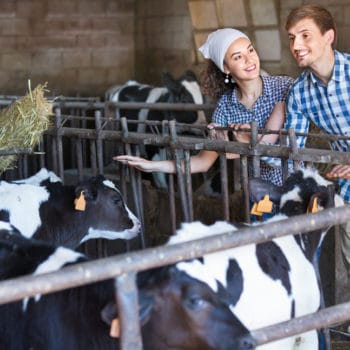Why We Love It
-
$23,630Potential Avg. Salary
-
10.5%Job Growth Rate
-
Growing DemandJob Outlook
-
Don't Take Work HomeCareer Attribute
The primary task of a zookeeper is to manage and take care of zoo animals and their environment, whether in safari parks, zoos or aquariums. In this position, you are also the first point of contact for visitors to the zoo.
Recommended Schools
What is a Zookeeper?
Duties
Professional zookeepers carry out a variety of significant duties including those mentioned below:
- Assess and maintain all animal exhibits, holding areas and any other spaces; check enclosures and cages for signs of wear or damage
- Prepare appropriate animal food by chopping or grinding meat, fish, vegetables, or fruit, while creating and adhering to feeding schedules.
- Participate in operant conditioning animal training programs and enrichment techniques
- Maintain accurate daily records of animal health and behaviour on computer-based software
- Facilitate visitor interactions such as scheduled talks with guests at the zoo.
Day In The Life
Daily life in this role can be very exciting and fast-paced. To start with, you would devote a part of the day to feeding, grooming and cleaning the animals under their care. Animals at a typical zoo can range from elephants, giraffes, deer, snakes, birds, bears and so on.
Cleaning the living areas of a variety of animals and interacting with some of them is also a responsibility of the zookeeper. One also has to ensure that the assigned zoo animals receive accurate training and stay happy. You are expected to perform daily checks assessing the health of each animal and watching out for any abnormal behaviors implying disease, anxiety or stress.
Zookeepers are sometimes called on by veterinarians to advise them on animals’ health and can respond to public queries with information on animals’ anatomies, their natural habitats and typical behaviors. Conducting formal and informal educational training for the general public is part of the day-to-day operations as a zookeeper. Finally, if you are working at zoos with research capacities, you will have the opportunity to assist with research studies, once they develop specialized knowledge of an animal species.
Work Schedule And Typical Hours
Zoos are often open to the public around 363 days out of the year. You can expect to work both indoors and outdoors, during different time shifts since animals have varied requirements and do not keep regular hours. To be comfortable with changing work schedules, candidates must have dedication and be ready to work over weekends or holidays no matter what the season. Work can be demanding, especially in the winter months when the ground is frozen.
Growth Of The Job
Job openings for animal care and service workers are set to increase between 2014 and 2024. When new zoos are open, there are a small number of jobs on offer. The maximum number of hires are done when older staff are leaving their posts on retirement.
When you start out as a zookeeper, you can progress to a senior or head zookeeper or, with advanced training, to area supervisor or assistant curator and then curator. Job growth is based on the size of the zoo, its operating policies and an individual’s qualifications. Continued professional education in husbandry, veterinary care, and other technology is required in order to advance in this profession.
Typical Employers
Typical employers include zoos, aquariums, and wildlife parks or sanctuaries. Most zoos are owned either by charitable trusts or state authorities in the US. Although the pay is low and the working conditions can be challenging, competing for open positions of employment can be tough. Some zoos require aptitude tests and a valid driver’s license.
Recommended Schools
How To Become a Zookeeper
While there are no formal educational requirements for becoming a zookeeper, most possess a college degree in a relevant area. For instance, having a four-year bachelor’s degree in biology, animal science, zoology, marine biology, psychology, or a related field will put you in good stead of decent job opportunities. These programs consist of coursework that proves helpful when dealing with animals on a daily basis, for example, animal behaviors, genetics, microbiology, reproduction and physiology.
Other ways to get ahead in your career includes gaining animal care experience or an internship at a zoological facility. Increasingly, zoos are providing volunteer opportunities for youth, such as Explorers or Junior Zookeeper programs, which are similar to programs for adult volunteers with closer supervision. More and more job openings look for prior animal training experience, so hands-on skills through working at an actual zoo is an advantage over other aspirants to zookeeper roles.
Zookeeper Salary Data
We’ve provided you the following to learn more about this career. The salary and growth data on this page comes from recently published Bureau of Labor Statistics data while the recommendations and editorial content are based on our research.
National Anual Salary
Low Range
$18,580Average
$23,630High Range
$34,780National Hourly Wage
Low Range
$9/hrAverage
$11/hrHigh Range
$17/hrHow do Zookeeper salaries stack up to other jobs across the country? Based on the latest jobs data nationwide, Zookeeper's can make an average annual salary of $23,630, or $11 per hour. This makes it an Above Average Salary. On the lower end, they can make $18,580 or $9 per hour, perhaps when just starting out or based on the state you live in.
Salary Rankings And Facts
#785 Nationally for All Careers
Programs and Degrees
Here are the most common degrees for becoming a Zookeeper. a is usually recommended and specifically a degree or coursework that prepares you for the particular field, see below.
Highest Education Among Zookeepers
- 0.9% Doctorate
- 2.4% Masters
- 16.3% Bachelors
- 8.3% Associates
- 27.2% College
- 34.7% High School
- 10.2% Less than High School
Job Growth Projections and Forecast
2014 Total Jobs
204,8002024 Est. Jobs
226,400Job Growth Rate
10.5%Est. New Jobs
21,600How does Zookeeper job growth stack up to other jobs across the country? By 2024, there will be a change of 21,600 jobs for a total of 226,400 people employed in the career nationwide. This is a 10.5% change in growth over the next ten years, giving the career a growth rate nationwide of Below Average.
Growth Rankings And Facts
#172 Nationally for All Careers
What Companies Employ The Most Zookeepers
| Industry | Current Jobs | New Jobs Needed | % Increase |
|---|---|---|---|
| Other personal services | 67,900 | 11,800 | 12% |
| Self-employed workers | 39,200 | 3,400 | 3% |
| Other miscellaneous store retailers | 28,400 | 700 | 1% |













